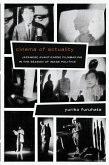Airing on ABC from 1957 to 1962, Maverick appeared at a key moment in television Western history and provided a distinct alternative to the genre's usual moralistic lawmen in its hero, Bret Maverick. A non-violent gambler and part-time con man, Maverick's principles revolved around pleasure and not power, and he added humor, satire, and irony to the usually grim-faced Western. In this study of Maverick, author Dennis Broe details how the popular series mocked, altered, and undermined the characteristics of other popular Westerns, like Gunsmoke and Bonanza. Broe highlights the contributions made by its creators, its producer, Roy Huggins, and its lead actor, James Garner, to a format that was described as "e;the American fairy tale."e; Broe describes how Garner and Huggins struck blows against a feudal studio system that was on its last legs in cinema but was being applied even more rigidly in television. He considers Maverick as a place where multiple counter-cultural discourses converged-including Baudelaire's Flaneur, Guy DeBord's Situationists, and Jack Kerouc's Beats-in a form that was acceptable to American households. Finally, Broe shows how the series' validation of Maverick's outside-the-law status punctured the Cold War rhetoric promoted by the "e;adult"e; Western. Broe also highlights the series' female con women or flaneuses, who were every bit the equal of their male counterparts and added additional layers to the traditional schoolteacher/showgirl Western dichotomy. Broe demonstrates the progressive nature of Maverick as it worked to counter the traditional studio mode of production, served as a locus of counter-cultural trends, and would ultimately become the lone outpost of anti-Cold War and anti-establishment sentiments within the Western genre. Maverick fans and scholars of American television history will enjoy this close look at the classic series.
Dieser Download kann aus rechtlichen Gründen nur mit Rechnungsadresse in A, B, BG, CY, CZ, D, DK, EW, E, FIN, F, GR, HR, H, IRL, I, LT, L, LR, M, NL, PL, P, R, S, SLO, SK ausgeliefert werden.









